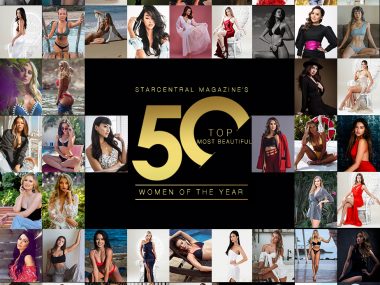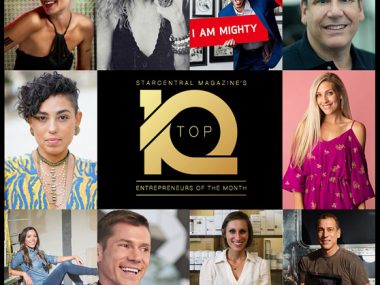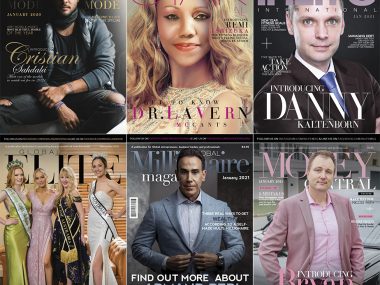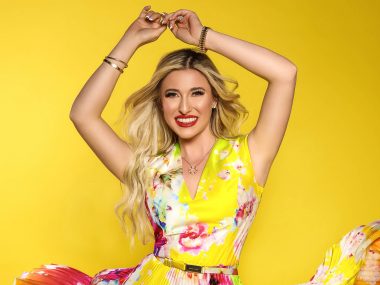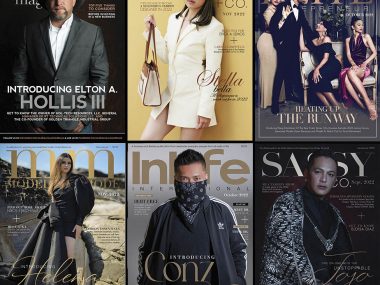Introducing StarCentral Magazine’s June 2024 cover star, Lachi – an extraordinary figure in the music and social entrepreneurship sectors. Lachi is a globally touring singer and songwriter, an award-winning social entrepreneur, a GRAMMYs Chapter Board Governor, and the host of PBS’ American Masters series ‘Renegades.’
Born legally blind, Lachi leverages her platform across music, storytelling, and fashion to amplify identity pride and Disability Culture. As the founder of the U.N.-recognized organization RAMPD (Recording Artists and Music Professionals with Disabilities), Lachi has driven disability-inclusive initiatives in collaboration with industry giants like Grammys, Netflix, Tidal, and Sony Pictures Entertainment.
Lachi’s distinctive style, highlighted by her bejewelled glam canes, has been a standout feature at New York Fashion Week and major LA movie premieres. Her performances, including powerful ballads on TEDx stages, integrate her disability identity seamlessly into her art, making her a beacon for Disability Pride in mainstream discussions.
As the founder of RAMPD, Lachi has forged partnerships with top-tier companies to promote disability-inclusive programming and create career opportunities for music professionals with disabilities, neurodivergence, and chronic and mental health conditions. In 2023, RAMPD received significant recognition and funding, including a Music Business Association award and support from Borealis Philanthropy, for its efforts to bridge the inequality gap in the music industry.
Lachi also holds governance and advisory roles on the GRAMMY’s New York Chapter Board, the National Independent Venue Association, the Songwriters of North America, and the Audio Engineering Society DEI Committees. Her influence and advocacy have earned her spots in national ads, discussions with the White House, and features in prominent publications like the New York Times, Billboard, Forbes, and USA Today.
Beyond her artistic and entrepreneurial achievements, Lachi is a sought-after consultant, keynote speaker, and performer. She collaborates with top music entities and institutions, such as the White House, the UN, BBC, Lincoln Center, and Google, to advance disability, identity, and culture. Her advocacy work has been featured in Essence, Vogue, and the LA Times. She has been listed in Cranes Business 40 Under 40, received a Social Justice Award from New York City Nightlife United, and was recognized in JPMorgan Chase’s “100 Women to Know,” USA Today’s 2024 “Woman of the Year” and AfroTech’s “Future 50 Changemakers.” StarCentral Magazine recently caught up with Lachi to discuss her journey in the industry, and here’s what went down:
Can you share your journey of how you started in the music industry and how you’ve navigated your career as a legally blind artist?
Music has always been in my life, from listening to my favorites to understand the big, scary world through their eyes to creating music to express myself fully as a quiet outcast kid. Taking to the keys, the pen, and the pad has been the guiding force that has led me to embrace the parts of myself that society had long urged me to conceal.
Throughout the late 2010s, I found myself in bigger and better rooms in the Dance music space for my vocals, toplining, and writing. I did all I could to hide my vision loss, to code-switch, to fit a mold. It wasn’t until COVID-19 that I began to make my home studio accessible for my own needs and pace. I veered away from writing cookie-cutter lyrics to fit someone else’s story and began exploring my own. And in so doing, I quickly began to realize it was not my condition that was the problem but society’s conditioning. I began to advocate for self-acceptance, disability pride, neurodivergence, and mental health awareness. By 2022, I was releasing songs that celebrated all parts of myself, like “Black Girl Cornrows” with Black Caviar, Yvie Oddly and QuestionATL, Shorty Award-Honoree “Lift Me Up” with James Ian and Gaelynn Lea, and performing songs like “Dis Education” co-created with apl.de.ap. From performing songs about my experience on the TEDx stage to showing up on red carpets with a bedazzled glam cane to putting together our new album, Mad Different, I incorporate my advocacy into all aspects of my art and art into all aspects of my advocacy.
The LUM, Lima Peru 2023
Photo credit: Rodrigo de Quesada – Lachi singing in Chio Lecca Dress
What inspired you to create your organization RAMPD, and how has it impacted the music industry so far?
I found that I wasn’t the only professional artist in real spaces afraid to disclose my disability, condition, or neurodivergence for fear of being viewed as non-competitive. As I navigated virtual space throughout the pandemic, I spoke to more and more folks who were in my situation—professionals making money, making hits, touring, navigating the corporate industry ladder—who felt the same way. I began to wonder, how are there so many of us feeling isolated? I hadn’t known yet how irrevocably strong the power of community truly is.
After a public panel discussion with the Recording Academy, it was brought to light that not enough was being done to support music professionals with disabilities, from artists to industry-side folks. After that discussion flew across the music verse, people began to inbox me, asking about the coalition that they had spoken with the Recording Academy about and how they could join. At first, I was reluctant to begin founding an organization, building a platform, or heading up a movement. I was just an artist who loved to sing and write songs. But as the momentum continued to build in the wake of that panel discussion, the acronym RAMPD (Recording Artists and Music Professionals with Disabilities) popped into my head like a light switch flicking up, and it was a wrap.
Your song “Lift Me Up” has gained significant recognition. Can you tell us about the inspiration behind this song?
Judy Heumann was a disability rights legend who fought for key legislation, such as the Americans with Disabilities Act. I first learned about her through a 2018 episode of Drunk History on Comedy Central, where they highlighted the story of a Sit-In she co-organized. A few years later, Judy reached out to me and asked if she could use a song of mine to introduce her podcast, and I was like, “Wait, you’re the same badass Judy from the TV who single-handedly changed my life, right?” We became great friends and co-mentors. She really instilled in me the power to lift up the community.
I was shocked by her passing in 2023. Writing “Lift Me Up” was my way of processing my grief while paying tribute to her influence on me and countless other people, including my co-artists, James Ian and Gaelynn Lea. The song was released by RAMPD Records, and the music video—featuring top viral sign language performers, Tony winner Ali Stroker and diverse, queer, and disabled crew—debuted on MTV.com and found support from folks like Google, Coldplay, and BETSoul. We had no idea it would go viral and become a disability pride anthem of sorts, screening on Diversity Day at the Cannes Festival, being honored with a Shorty Award, winning two International Songwriting Competition awards, and finding tons of coverage. It is a song about lifting up our communities, and through mainstream exposure, it got a lot of folks thinking and talking about disability, just like the episode of Drunk History had done for me.
As a GRAMMYs Chapter Board Governor, what initiatives are you most passionate about promoting within the organization?
I’ve thoroughly enjoyed serving on a number of music industry Boards and Committees, including the National Independent Venue Association, Songwriters of North America, the Audio Engineering Society, and others. Sitting as a GRAMMYs Board Governor on the New York chapter, I serve on the Advocacy Committee and the Songwriters and Composers Wing. I am super proud to have spearheaded the New York Chapter Diversity Equity and Inclusion Taskforce in 2022, where we focus on amplifying and fostering community for the many identity groups contributing to today’s music ecology.
You’ve worked with major companies like Netflix and Sony Pictures Television on disability-inclusive solutions. Can you share some examples of these collaborations and their outcomes?
RAMPD does two things really well: equipping the music industry with inclusive solutions–programming and people– and connecting music professionals with disabilities, neurodivergence, and other conditions with community, resources, access, and opportunity. We work on programs that amplify Disability Culture, bring awareness to our contributions, and promote equitable inclusion within the industry while working to shape the way folks with disabilities, neurodivergence, and other chronic conditions are viewed—from inspirational or tragic to talented and competitive. We’ve had the honor of working with some great organizations, firms, labels, and educational institutions (later recruiting some of those folks to be on our Advisory Board) on everything from workshops, panels, and market research think tanks to ads campaigns and performance lineups, to event or venue accessibility and belonging consultations. RAMPD has been very busy, and we are super proud of our work’s impact on the industry.
April Lockhart photoshoot, NYC 2024 —(Wardrobe credit:Hannah Howard)
What was it like hosting PBS’ American Masters series ‘Renegades,’ and how do you select the stories you feature on the show?
as an honor working on the series, traveling the nation, and working with the different teams, all led by filmmakers with disabilities. Debuting in October 2024, The five-episode series highlights five American rebels and revolutionaries with disabilities who’ve helped shape America, and five teams of disabled filmmakers produced, directed, and wrote each episode—the episodes. When series creator and FWD-Doc co-founder Day Al-Mohamed, who served as Director of Disability Policy at the White House, tapped me to host, I jumped in. It has been a transformational experience deep-diving into these renegades. I look forward to the world learning about these unsung American heroes and to what’s to come. This is an impactful opportunity to have disability-centered in front and beyond the camera, in the director’s chair, and hosting.
Your bejeweled glam canes have become a fashion statement. How do you use fashion to make a statement about disability pride?
I consider my glam canes a means to combat erasure and eviscerate stigma. For so long, and as well today, so many people, disabled, neurodivergent, or non-disabled alike, do all they can to pretend disability does not exist. My canes—bejeweled with different color rhinestones to match my evening gowns—are an extension of my authentic self, boisterousness, high fashion, and disability pride. So often, folks view disability as something to pity, help, or save, but not Lachi. When people see me walking down the street with 6-inch heels and a matching bedazzled cane, they dive out of the way as all of their stereotypes come crumbling down. We now sell the glam canes online and watch as all types, from young Swifties to men in suits, send over pics of their newfound confidence. It’s one of my most flagrant and widely impactful methods of advocacy. And I don’t have to say a word.
Can you discuss a memorable moment or achievement you’re particularly proud of in your advocacy work?
Outside of being deemed USA Today’s 2024 Woman of the Year? It would have to be our GRAMMY’s red carpet takeover! At the 2024 GRAMMYs, we at RAMPD worked diligently and were able to get a host of our members onto different carpets, including the official GRAMMYs Red Carpet. We had wheelchairs, prosthetics, and glam canes all up and down the press line, getting photographed by the press, speaking to outlets on different disability issues, and really celebrating Disability Culture for the non-disabled and disability communities alike to see, join, and amplify. Our community partnership with the GRAMMYs is one we at RAMPD hold dear, as the Recording Academy was a very early supporter of our mission to bring disability inclusion to the music industry.
What advice would you give to aspiring artists and musicians with disabilities who are looking to break into the industry?
Stay ready. You don’t have to get ready if you stay ready. That means investing in being undeniable at your craft, infusing your talent with an authentic personal brand, and showing up. Whether it be hours learning from YouTube, rehearsing, taking lessons, or interning, every successful career begins with honing your craft. Be authentic. Lean into your strengths, what you love, and who you are, and infuse that unique part of yourself– the thing that makes you stand out– into your art and/or your personal brand. And, of course, show up! Virtually or in person, get out there. Network, scope out, and support your colleagues in the industry. Then rinse and repeat.




